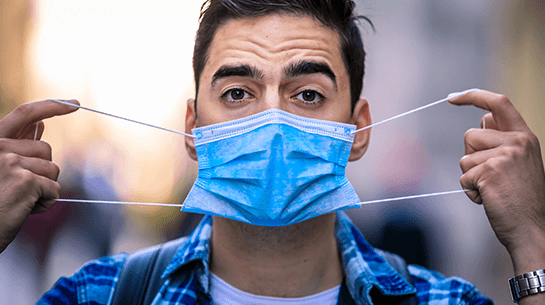
Masks: learn how to dispose it correctly and help preserve the environment
Disposable masks mostly produced from synthetic fabric known as TNT have been widely used by the population due to its convenience, low cost and for not requiring washing.
But the need for their use, while avoiding Covid-19 infection and contamination, brought an aggravating factor: incorrect disposal of disposable masks. TNT is estimated to take 400 to 450 years to decompose in nature and health authorities around the world are already concerned about this new form of environmental contamination.
There is no approximate amount of production of disposable masks in recent months, but this number is indeed extremely huge. Brazilian Textile Industry Association, for example, has mobilized hundreds of companies to produce and donate 13.5 million disposable and fabric masks. Prisoners in São Paulo State produced 1.5 million TNT masks up to May this year.
Improperly disposed masks were found in the sands and natural trails in Hong Kong, a region governed by China, where most of the 7.4 million inhabitants use facial protective equipment to combat Covid-19. Environmentalists are warning that these residues represent a major threat to human life, marine life and wildlife habitats. In addition of aggravating the pollution, this garbage is a risk for increasing a possible spread of the new Coronavirus.
In Brazil, the situation is not different. Garbage recycling plants have been required to adopt differentiated strategies with the collectors to avoid that they get contaminated with masks improperly discarded in the recyclable garbage. Even with protective equipment, if employees lean against a contaminated mask and take their hand to their face, they can be infected by Covid-19. Some cooperatives are quarantining the waste before its separation.
HOW TO DISPOSE MASKS CORRECTLY
Brazilian Association of Sanitary and Environmental Engineering (ABES) warns that there is a correct way to dispose used masks and gloves. The materials must be put into two plastic bags (one inside the other), and these must be firmly tied and thrown into the regular garbage basket, the so-called bathroom garbage.
It is important to highlight that the protective mask or any disposable material used to contain the pandemic, such as gloves or aprons, should not be thrown in recyclable waste. Care must be doubled if materials have come into contact with a contaminated person, and when throwing in the garbage basket into a plastic bag, it must be signaled with the words: RISK OF CONTAMINATION.
NEW HABIT OF USING MASKS
Since the beginning of the new coronavirus pandemic, in March 2020, protective masks started to be used more frequently and, in June, the World Health Organization (WHO) updated its recommendations and indicated their use in public establishments. Many Brazilian cities have ordered its mandatory use and also imposed fines in case of non-compliance. In the Federal District, for example, since May 11, those not using masks in the streets or public spaces may be required to pay a R$ 2 thousand fine.
The use of masks was already a common habit by Asian people and now it became a part of everyone’s daily routine. Many believe that its use will continue to be a part of the society routine in view of hygiene and health issues, even after Covid-19 control.
In Japan, people use masks when they are sick showing respect for the others, to avoid infect them. Currently, it represents a sign of protection and solidarity, since the sick individual reduces the spread and the healthy individual avoids contamination. This is not only an emergency use for individual protection, but a collective safety strategy that will lead people to protect each other from now on.
Specialists warn that a good mask must protect the nose and mouth and allow the natural movement when the person talks, but avoiding opening in its sides. The mask purpose is to prevent saliva droplets from being thrown into the air and also to prevent droplets of other people from reaching the face, lips, nose and eyes.
NEOENERGIA’S RECOMMENDATIONS ON THE USE OF MASKS
In order to protect the environment, Neoenergia provides to its employees who were working from home and are now returning back to the company’s facilities a kit with washable masks for individual and permanent use throughout the working hours and also to be used when traveling for work and going back home. The company has chosen washable masks because their useful life is longer and they generate less solid waste.
News
2025-12-12
Prêmio Brasil Olímpico 2025: Neoenergia reforça compromisso com esporte feminino no país
2025-12-09
Prêmio Aberje 2025: Neoenergia é campeã nacional com campanha sobre segurança na rede elétrica com Carlinhos Brown
2025-12-01
Exclusivo a mulheres negras, Prêmio Inspirar 2025, do Instituto Neoenergia, anuncia vencedoras em quatro estados e no DF
2025-11-27
Neoenergia e Honda se unem para acelerar uso do hidrogênio verde na mobilidade brasileira
2025-11-25
